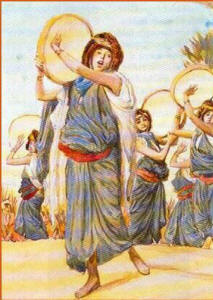|
Miriam
Miriam
is introduced to us as the sister of Moses, left to watch over him
in his little ark of bulrushes. Pharaoh’s daughter found him and
recognised him as “one of the Hebrews’ children” (Ex
2.6), but her natural instinct led her to adopt Moses as her
own son, even though her father had decreed that “Every
son that is born ye shall cast into the river” (Ex
1.22). Alert and quick-witted, Miriam suggested she call one
of the Hebrew women to nurse the child, and, this being agreed, she
brought Moses’ own mother to the princess. Not only was Moses’ life
spared, but also the Lord ensured that he would be brought up to
know his people and their God. Nothing thwarts God’s purposes, not
even the decrees of Pharaoh, and His ways are beyond human
understanding. We owe Miriam a dept of simple gratitude for what she
did that day.

The next time we read of Miriam, the
Israelites had escaped from Egypt and had seen the pursuing
Egyptians overthrown into the Red Sea. They sang a glorious song to
the Lord and Miriam took the lead as an enthusiastic and earnest
encourager of praise among the women. They sang and danced their joy
and praise to the accompaniment of their timbrels. Miriam kept
urging the women to continue their joyful song. She was obviously a
woman of natural ability, a born leader. She was also a prophetess,
and favoured with divine communications. In accordance with how
things were done, she would not have prayed and prophesied publicly,
but would have spoken the mind of God to those individuals who came
to her, just as did Deborah (Judg
4.4), Huldah (2
Kings 22.14), and the four daughters of Philip the evangelist
(Acts 21.9).
It’s sad that the events of
Numbers 12
had to be written, for they are a blemish on the record of Miriam’s
life, but we cannot undo what has been done. Miriam wanted a public
position in the leadership of the people of God, and, using the
occasion of Moses marrying an Ethiopian woman, she encouraged her
younger brother Aaron to join her in confronting Moses. Her
motivations and intentions were plain: “Hath
the Lord indeed spoken only by Moses? Hath He not spoken also by us?
And the Lord heard it” (v.2). She is the first woman in the
Bible to seek to assert herself in this way, and demand equality
with men in leadership among God’s people. We hear the same claims
being made today, but they are inconsistent with God’s revealed
mind. From the time of the fall, and Eve’s transgression, the woman
was made subject to her husband, and this principle extends into New
Testament times and is part of the apostles’ doctrine (Gen
3.16;
1 Cor 11.3-16;
14.34-37;
1 Tim 2.9-15;
1 Pet 3.1-6).
So far as the gospel is concerned, there
are no distinctions to be made of race, social situation, or gender,
but wives and husbands, children and parents, and servants and
masters are all exhorted separately regarding their position in the
church (Gal 3.28,29;
Eph 5.22-6.9;
Col 3.18-4.1).
Miriam did not understand God’s order and spoke out of turn. She may
have been motivated by merely human reasoning, and probably thought
that as women are equally endowed with ability and insight there was
no reason she should not be as Moses. She may have felt frustrated
and even ill-used after all she had done. She had shown that she had
a lively mind, rational ability, and was able to encourage others.
The trouble was that she did not
understand Moses’ special relationship with the Lord, and took the
initiative in criticising Moses.
Num 12.1
reads: “And Miriam and Aaron spoke against
Moses”. We must not forget that God hears what we say, and He
was now greatly displeased. The Lord
replied to Miriam’s criticism by announcing His own confirmation of
Moses special status. The Lord rebuked Aaron and Miriam. The cloud
of His visible presence departed from over the tabernacle, and, due
to her presumption, Miriam was stricken with leprosy. She was
healed but was kept outside the camp for seven days as a mark of
divine displeasure. It was the minimum sentence the Lord could
allow. So it is with us when we fail, the opportunity for us to
return in repentance is there, and the Lord will not continue to
hold our failings against us.
As with all Bible characters,
Miriam is an example to us of
human strength and weakness, success and failure. Let us not forget
all the good things about her. She died in Kadesh-barnea; her grave
is in the wilderness and she never entered the Promised Land, but
her cherished place in Bible history is secure.
|

